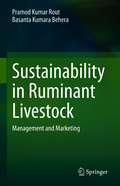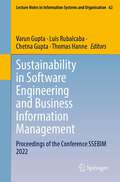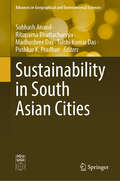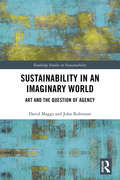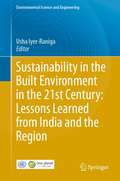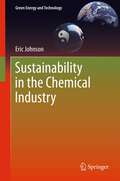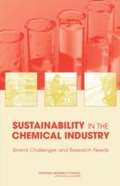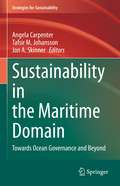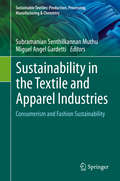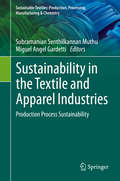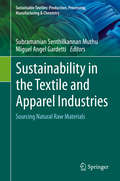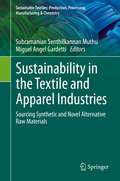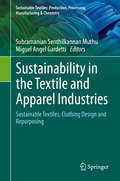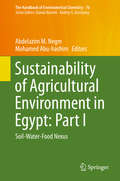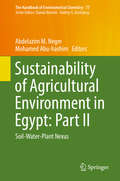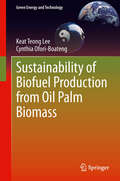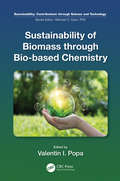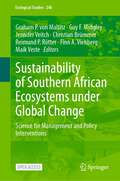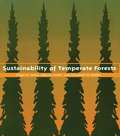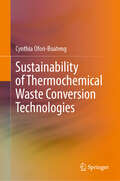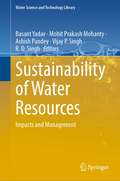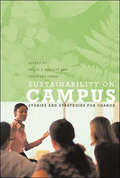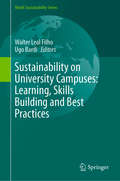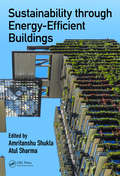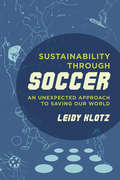- Table View
- List View
Sustainability in Ruminant Livestock: Management and Marketing
by Basanta Kumara Behera Pramod Kumar RoutThis book presents a concept for implementing a mass balance approach toward developing an effective eco-friendly, livestock farming system independent of external energy input. In this context it describes a modern, integrated farming system, and includes comprehensive technical information explaining the design and evaluation of manure management systems, and modeling and operational tools. It first discusses the mass balance operating process, highlighting the difference between imported and exported mass across the farm boundary. Estimating mass balance can provide critical information for (comprehensive) nutrient management planning and for managing the movement of nutrients and manure. It then explains the estimation of whole-farm P mass balance using a suitable model system. The subsequent chapters provide updated information on management aspects of livestock-farming and generation of multiple job opportunities, and also explore various aspects of livestock farming operational protocols like housing and management; nurture of rams, ewes and lambs, new born calves and heifers; care of buck, doe and kid- nutrition flushing; concept zero grazing-systems; disease control and management; integrated goat farming; and crop-livestock integration. Further, the book addresses crop-livestock integration; energy autonomy in cattle farming; value added biopharmaceuticals from cattle farming; CAPEX for cattle farming; concepts of cattle farming; detrimental effects of the industry; topographic and edaphic factors, and thermal stress on livestock growth and development; socioeconomic development; and water requirements for livestock. The book concludes with the most important issue in the field of agriculture and veterinary science: “Livestock Farming with Care,” describing sustainable, eco-friendly livestock farming by highlighting issues like animal feed vs. human food; agricultural GDP vs livestock, and factors affecting the sustainability of livestock farming. Given its scope, this book is a valuable resource for researchers and students alike, and will also appeal to practitioners in the field of livestock.
Sustainability in Software Engineering and Business Information Management: Proceedings of the Conference SSEBIM 2022 (Lecture Notes in Information Systems and Organisation #62)
by Thomas Hanne Varun Gupta Chetna Gupta Luis RubalcabaThe proceedings volume presents selected papers from the International Conference on Sustainability in Software Engineering & Business Information Management: Innovation & Applications (SSEBIM 2022) held in Olten, Switzerland from September 23-24, 2022. It includes research related to sustainability from both a business and technical point of view. From a business perspective, it not only addresses how to make the business operations more sustainable, but also considers factors such as human values, ethics, environment and responsibility of the businesses. From the technical perspective of software development companies, it focuses on sustainability in software engineering ranging from practices, tools, techniques and methods. The contributions reflect how software engineering teams exhibited pro-activeness in their approaches to lead to sustainable development of the software that is of highest quality and reliability.It is intended for a broad audience, including students, researchers and practitioners who work in software engineering and business information management fields.
Sustainability in South Asian Cities (Advances in Geographical and Environmental Sciences)
by Subhash Anand Rituparna Bhattacharyya Pushkar K. Pradhan Madhushree Das Tulshi Kumar DasThis book explores some of the common socio-economic and environmental challenges faced by the cities of South Asia, which remain highly under-researched. South Asia comprises eight nations—India, Bangladesh, Nepal, Sri Lanka, Bhutan, Maldives, Pakistan, and Afghanistan, consisting of a total population of 1.92 billion in 2022. The majority of the cities in these countries are characterized by haphazard urbanization and multi-dimensional poverty alongside its associated ingredients— floods, water scarcity, food crises, poor sanitation, slums and squatter settlements, and pollution, among others. This comprehensive book is contributed by interdisciplinary scholars and includes 25 case studies. The volume brings these socio-economic and environmental challenges to the fore for a better and more nuanced understanding. The book help policymakers to mitigate the challenges and build sustainable cities.
Sustainability in an Imaginary World: Art and the Question of Agency (Routledge Studies in Sustainability)
by John Robinson David MaggsSustainability in an Imaginary World explores the social agency of art and its connection to complex issues of sustainability. Over the past decade, interest in art’s agency has ballooned as an increasing number of fields turn to the arts with ever-expanding expectations. Yet just as art is being heralded as a magic bullet of social change, research is beginning to throw cautionary light on such enthusiasm, challenging the linear, prescriptive, instrumental expectations such transdisciplinary interactions often imply. In this, art finds itself at a treacherous crossroads, unable to turn a deaf ear to calls for help from an increasing number of ostensibly non-aesthetic fields, yet in answering such prescriptive urgencies, jeopardizing the very power for which its help was sought in the first place. This book goes in search of a way forward, proposing a theory of art aiming to preserve the integrity of arts practices within transdisciplinary mandates. This approach is then explored through a series of case studies developed in collaboration with some of Canada’s most prominent artists, including internationally renowned nature poet Don McKay; Italian composer and Head of Vancouver New Music, Giorgio Magnanesi; the renowned Electric Company Theatre, led by Kevin Kerr; and finally through a largescale multimedia installation aiming to reimagine the relationship between climate, culture, and human agency. Sustainability in an Imaginary World will be of great interest to students and scholars of arts-based research fields, sustainability studies, and environmental humanities.
Sustainability in the Built Environment in the 21st Century: Lessons Learned from India and the Region (Environmental Science and Engineering)
by Usha Iyer-RanigaThis book follows on previous works addressing sustainable development research in the Asia-Pacific region. It mainly focuses on India, a country currently facing immense challenges in the form of climate change, rapid urbanisation, and population pressures in its journey to help achieve the Sustainable Development Goals. Expecting to surpass China in terms of population in the near future, India needs to develop its own solutions in order to uphold its commitments under the Paris Agreement. This book makes a contribution in that direction by presenting case studies on various aspects of the built environment, from education to managing cities, procurement, and considerations for a circular economy. The papers gathered here offer a vital resource for government policymakers, educators, and current and future professionals, equipping them with the knowledge and expertise they need in order to overcome today’s complex challenges in the built environment.
Sustainability in the Chemical Industry
by Eric JohnsonIt's the new rock and roll. It's the new black. Sustainability is trendy, and not just among hipsters and pop stars. The uncool chemical sector helped pioneer it, and today, companies inside and outside the sector have embraced it. But what have they embraced? Surely not the Brundtland definition of meeting "the needs of the present without compromising the ability of future generations to meet their own needs." Sustainability describes a change in the chemical industry's approach to the external world: to regulators, to greens, to neighbors, to investors and to the general public. Displacing the adversarialism of the 1970s-80s, sustainability is a new approach to social/political conflict, and an attempt to rebuild the industry's long-suffering public image. In practice, it consists of: A 'stakeholder' approach to communications and external relations A rebranding of regulatory compliance and risk management, with the emphasis on their benefits to stakeholders Recognition (and even celebration) of the opportunities, not just the costs, of environmental and social protection The core of this book is a survey of the world's 29 largest chemical companies: how they put sustainability into action (six of the 29 do not), and the six 'sustainability brands' they have created. It begins with a history of stakeholders conflict, before looking at various definitions of sustainability - by academics, by the public and by investors. After the survey and analysis, the book covers sustainability and 'greenwash' plus the ROI of sustainability, and it gives five recommendations.
Sustainability in the Chemical Industry: Grand Challenges and Research Needs
by Committee on Grand Challenges for Sustainability in the Chemical IndustryThrough innovative design, creation, processing, use, and disposal of substances, the chemical industry plays a major role in advancing applications to support sustainability in a way that will allow humanity to meet current environmental, economic, and societal needs without compromising the progress and success of future generations. Based on a workshop held in February 2005 that brought together a broad cross section of disciplines and organizations in the chemical industry, this report identifies a set of overarching Grand Challenges for Sustainability research in chemistry and chemical engineering to assist the chemical industry in defining a sustainability agenda. These Grand Challenges include life cycle analysis, renewable chemical feedstocks, and education, among others.
Sustainability in the Maritime Domain: Towards Ocean Governance and Beyond (Strategies for Sustainability)
by Angela Carpenter Tafsir M. Johansson Jon A. SkinnerThis volume explores options for a sustainable maritime domain, including maritime transportation, such as, Maritime Spatial Planning (MSP), maritime education and training, maritime traffic and advisory systems, maritime security. Other activities in the maritime domain covered in the book include small-scale fisheries and sustainable fisheries, and greening the blue economy. The book aims to provide the building blocks needed for a framework for good ocean governance; a framework that will serve through the next decade and, and hopefully, well beyond the 2030 milepost of the UN Agenda for Sustainable Development. In short, this book brings together the problems of the current world and sustainable solutions that are in the development process and will eventually materialize in the not so distant future. Additionally, the book presents a trans-disciplinary analysis of integral sustainable maritime transportation solutions and crucial issues relevant to good ocean governance that have recently been discussed at different national, regional and international fora, highlighting ongoing work to develop and support governance systems that facilitate industry requirements, and meet the needs of coastal states and indigenous peoples, of researchers, of spatial planners, and of other sectors dependent on the oceans.The book will be of interest to researchers across many disciplines, especially those that are engaged in cross-sectoral research and developments in the maritime transport sector and across the wider maritime domain. To this end, the book covers areas including natural and social sciences, geographical studies, spatial planning, maritime security and gender studies, as they relate to transport and the wider maritime sector. In addition, the book explores frameworks for sustainable ocean governance being developed under the UN’s Agenda for Sustainable Development to 2030. It will also look beyond the 2030 milepost under that Agenda, and will be of use to national and international policymakers and practitioners, government actors at the EU and other regional and national levels and to researchers of ocean governance, sustainability and management, and maritime transport.
Sustainability in the Textile and Apparel Industries: Consumerism and Fashion Sustainability (Sustainable Textiles: Production, Processing, Manufacturing & Chemistry)
by Subramanian Senthilkannan Muthu Miguel Angel GardettiThis book is part of a five-volume set that explores sustainability in textile industry practices globally. Case studies are provided that cover the theoretical and practical implications of sustainable textile issues, including environmental footprints of textile manufacturing, consumer behavior, eco-design in clothing and apparels, supply chain sustainability, the chemistry of textile manufacturing, waste management and textile economics. The set will be of interest to researchers, engineers, industrialists, R&D managers and students working in textile chemistry, economics, materials science, and sustainable consumption and production. This volume focuses on sustainability aspects of consumerism and fashion, emphasizing the environmental issues that stem from textile care and disposal, and how many of these practices detrimentally impact the environment. Also addressed is the role of consumer knowledge and behavior associated with the clothing industry that may exacerbate these issues, and what can be done to better inform consumers about more sustainable options available to them. The case studies presented cover environmental and social sustainability in the clothing industry, and sustainable development in luxury fashion networks.
Sustainability in the Textile and Apparel Industries: Production Process Sustainability (Sustainable Textiles: Production, Processing, Manufacturing & Chemistry)
by Subramanian Senthilkannan Muthu Miguel Angel GardettiThis book is part of a five-volume set that explores sustainability in textile industry practices globally. Case studies are provided that cover the theoretical and practical implications of sustainable textile issues, including environmental footprints of textile manufacturing, consumer behavior, eco-design in clothing and apparels, supply chain sustainability, the chemistry of textile manufacturing, waste management and textile economics. The set will be of interest to researchers, engineers, industrialists, R&D managers and students working in textile chemistry, economics, materials science, and sustainable consumption and production.This volume addresses the technologies and mechanical processes of textile production, and what sustainable methods can be employed to achieve improved safety and environmental health. The book covers sustainable aspects of printing, dyeing, coloration, weaving, knitting, tailoring, surface design and antimicrobial finishing for environmentally friendly textile and apparel products.
Sustainability in the Textile and Apparel Industries: Sourcing Natural Raw Materials (Sustainable Textiles: Production, Processing, Manufacturing & Chemistry)
by Subramanian Senthilkannan Muthu Miguel Angel GardettiThis book is part of a five-volume set that explores sustainability in textile industry practices globally. Case studies are provided that cover the theoretical and practical implications of sustainable textile issues, including environmental footprints of textile manufacturing, consumer behavior, eco-design in clothing and apparels, supply chain sustainability, the chemistry of textile manufacturing, waste management and textile economics. The set will be of interest to researchers, engineers, industrialists, R&D managers and students working in textile chemistry, economics, materials science, and sustainable consumption and production. This volume comprehensively covers the various sustainable natural materials used in textiles that originate from raw materials sourcing. The book discusses agricultural production systems and standards for the development of sustainable textile fibers, the effects of chemical surface modification methods on the properties of textile fibers, and how antibacterial and antifungal textiles can be manufactured using natural resources.
Sustainability in the Textile and Apparel Industries: Sourcing Synthetic and Novel Alternative Raw Materials (Sustainable Textiles: Production, Processing, Manufacturing & Chemistry)
by Subramanian Senthilkannan Muthu Miguel Angel GardettiThis book is part of a five-volume set that explores sustainability in textile industry practices globally. Case studies are provided that cover the theoretical and practical implications of sustainable textile issues, including environmental footprints of textile manufacturing, consumer behavior, eco-design in clothing and apparels, supply chain sustainability, the chemistry of textile manufacturing, waste management and textile economics. The set will be of interest to researchers, engineers, industrialists, R&D managers and students working in textile chemistry, economics, materials science, and sustainable consumption and production. This volume explores some alternative synthetic raw materials resulting from the recycling and regeneration of renewable textile fibers, and how these sustainable green-based composites can contribute to improved ecological and human health. The book offers insights into the impacts of human-made fibers and microfiber pollution, and how biodegradable material sourcing can help to curb harmful environmental impacts from these practices and achieve clothing and apparel sustainability.
Sustainability in the Textile and Apparel Industries: Sustainable Textiles, Clothing Design and Repurposing (Sustainable Textiles: Production, Processing, Manufacturing & Chemistry)
by Subramanian Senthilkannan Muthu Miguel Angel GardettiThis book is part of a five-volume set that explores sustainability in textile industry practices globally. Case studies are provided that cover the theoretical and practical implications of sustainable textile issues, including environmental footprints of textile manufacturing, consumer behavior, eco-design in clothing and apparels, supply chain sustainability, the chemistry of textile manufacturing, waste management and textile economics. The set will be of interest to researchers, engineers, industrialists, R&D managers and students working in textile chemistry, economics, materials science, and sustainable consumption and production. This volume discusses novel trends and concepts in sustainable textile design, including innovative topics such as doodling and upcycling in clothing and apparel design for sustainable fashion initiatives. Along with strategies for repurposing fashion sustainability, the book also covers university interventions for the development of proper and environmentally friendly design practices. Specific technologies addressed include UV applications, laser treatments for dyeing, refined surface design techniques for products such as leather.
Sustainability of Agricultural Environment in Egypt: Soil-Water-Food Nexus (The Handbook of Environmental Chemistry #76)
by Abdelazim M. Negm Mohamed AbuhashimThis volume discusses the sustainability of Egypt’s agriculture and the challenges involved. It provides a comprehensive review and the latest research findings, and covers a variety of topics under the following themes: · Applicability of sustainable agriculture in Egypt · Sustainable agriculture under water scarcity and polluted soil environments · Improved crop productivity using a variety of tried and tested procedures · Biotechnology application for agricultural sustainability and food security · Potentiality of soil-sensing for a more sustainable agricultural environment The volume closes with a summary of the key conclusions and recommendations from all chapters. Together with the companion volume Sustainability of Agricultural Environment in Egypt: Part II, it offers an essential source of information for postgraduate students, researchers, and stakeholders alike.
Sustainability of Agricultural Environment in Egypt: Soil-Water-Plant Nexus (The Handbook of Environmental Chemistry #77)
by Abdelazim M. Negm Mohamed Abu-HashimThis volume discusses the sustainability of Egypt’s agriculture and the challenges involved. It provides a comprehensive review and the latest research findings, and covers a variety of topics under the following themes: · Integrated natural resources management for sustainable production · Integrated biopesticides and biofertilizers for sustainable agriculture · Integrated plant and animal production for a sustainable food supply · Policies for sustainable agriculture in Egypt The volume closes with a summary of the key conclusions and recommendations from all chapters. Together with the companion volume Sustainability of Agricultural Environment in Egypt: Part I, it offers an essential source of information for postgraduate students, researchers, and stakeholders alike.
Sustainability of Biofuel Production from Oil Palm Biomass
by Cynthia Ofori-Boateng Keat Teong LeeThis book evaluates and discusses the main sustainability challenges encountered in the production of biofuel and bio-products from oil palm biomass. It starts off with the emphasis on oil palm production, oil palm products recovery and oil palm wastes utilization. The simultaneous production of these bio-products for sustainable development is discussed. This is followed by the key factors defining the sustainability of biofuel and bio-product production from oil palm biomass. The environmental issues including ecological, life cycle assessment and environmental impact assessment of oil palm plantation, milling and refining for the production of biofuels and bio-products are presented. Socio-economic and thermodynamic analysis of the production processes are also evaluated using various sustainability assessment tools such as exergy. Lastly, methods of improving biofuel production systems for sustainable development are highlighted.
Sustainability of Biomass through Bio-based Chemistry (ISSN)
by Valentin I. PopaThe process of photosynthesis is a potential source of energy and bioproducts. Renewable sources of polymeric materials offer an answer to maintaining sustainable development of economically and ecologically attractive technology. The innovations in the development of materials from biopolymers, preservation of fossil-based raw materials, complete biological degradability, reduction in the volume of garbage and compostability in the natural cycle, climate protection through reduction of carbon dioxide released, and the application possibilities of agricultural resources for the production of bio/green materials are some of the reasons why such materials are attracting public interest.FEATURES Discusses waste from urban areas, forestry and agricultural processes, specifically grown crops such as trees, starch crops, sugar crops hydrocarbon plants and oils, and finally aquatic plants such as water seaweeds and algae, which can be used as raw materials for sustainable development. Presents recent advances in the development of some specifically chemical components of biomasses for a sustainable future. Focuses on lignocellulose as a source of bio-based products. Draws upon expertise from various countries. Describes how upgraded and integrated biomass processing may reduce the risks associated with the COVID-19 pandemic. Valentin I. Popa is professor emeritus of Wood Chemistry and Biotechnology at Gheorghe Asachi Technical University of Iasi, Romania.
Sustainability of Southern African Ecosystems under Global Change: Science for Management and Policy Interventions (Ecological Studies #248)
by Maik Veste Graham P. von Maltitz Guy F. Midgley Jennifer Veitch Christian Brümmer Reimund P. Rötter Finn A. ViehbergThis open access book about the sustainability of marine and terrestrial ecosystems in southern Africa provides a synthesis of the research program Science Partnerships for the Adaptation to Complex Earth System Processes (SPACES II, 2018-2022). It addresses the scientific, social, and economic issues related to climate change, its potential impacts on the various ecosystems, adaptations, and management interventions for enhancing systems resilience in Southern Africa. It is written by numerous scientists from African states and Germany and summarizes the latest research findings, which are of great relevance for a better understanding of climate change impacts, adaptations, and vulnerabilities as well as for developing management options and policy options to reduce the associated risks. This is crucial considering that the projected African population increase is exceptional. Furthermore, climate change is assumed to hit southern Africa extremely hard with a significant increase in extreme events and the frequency of severe droughts, heat waves, and flooding. Southern Africa hosts a high variety of ecosystems, which belongs to important biodiversity hotspots for unique flora and fauna. The surrounding oceans form, in turn, a bottle neck within the ocean’s global thermohaline circulation, act as a still poorly understood carbon sink and source and play an important role for fisheries as they are highly productive. Considering these important aspects, the book is an important interdisciplinary contribution to the scientific literature and will find a wide readership.The book is aimed at students, teachers, and scientists in the fields of terrestrial and marine ecology, environmental, nature and landscape planning, agriculture, environmental and resource management, biodiversity, and nature conservation, as well as scientists and representatives in specialised authorities and associations, nature conservationists, and policy makers of related disciplines.
Sustainability of Temperate Forests
by Roger A. Sedjo Alberto Goetzl Stevenson O. MoffatRFF's Roger Sedjo and his colleagues discuss initiatives designed to promote and enhance sustainable forestry in temperate countries. While concerns about tropical deforestation are considerable, temperate forests account for the vast majority of the world's roundwood production and most global trade in wood and paper. Improving forest sustainability in such regions is imperative, economically and environmentally. This book illustrates how far nations have progressed, and how far they still need to go, in that effort. The authors describe how temperate nations address forest sustainability, discussing recent developments affecting forestry and trade. Their compilation of international data on forest practices and regulation provides a useful comparative perspective. They analyze the effect of institutional changes (e.g., new laws) on land management. The volume assesses how national forestry industries are adapting to new laws and policies in the face of new realities in production and markets, particularly in the context of international trade and global competition. Country profiles provide details on sustainability policy and performance in eight timber-exporting or major wood-using temperate nations: the United States, Canada, Finland, Sweden, Germany, France, New Zealand, and Chile. The authors also assess how each nation would be affected by the application of various criteria for sustainability.
Sustainability of Thermochemical Waste Conversion Technologies
by Cynthia Ofori-BoatengThis book elaborates on the sustainability of biofuels and biochemicals production via thermochemical conversion pathways. Sustainability encompasses the social, economic, environmental, political, and thermodynamic efficiencies of a production technology. Assessing the sustainability of wastes conversion pathways would help pinpoint inefficiencies hence improving the process economically, environmentally, and thermodynamically. This book discusses the major sustainable potential feedstocks/waste for thermochemical conversion into bioproducts such as biodiesel and bioelectricity. Though there exist many pathways for thermochemical waste conversion (such as combustion, gasification, and pyrolysis) which operate on laboratory, pilot and commercial scales, their sustainability indices are scarce as there exist few sustainability assessment tools to help pinpoint inefficiencies. This book assesses the sustainability of various types of thermochemical conversion pathways using technoeconomic analysis as well as exergetic life cycle assessment tools. Common sustainability issues and the way forward for sustainable thermochemical wastes conversion into bioproducts are detailed in this book. For overall sustainability, thermochemical waste conversion process development alternatives are also discussed in this book. Given its scope, this is a valuable resource for renewable energy policy makers, bioprocess researchers in academia and related industries, students studying in the fields of Green Chemistry, Chemical and Mechanical Engineering as well as the general publics who have great interest in biofuels for sustainable development. Almost all books on thermochemical biomass conversion address only the process and new technologies, but few tend to address the technical and thermodynamic issues pertaining to sustainability due to the use of fossil fuel in the manufacturing process. This book bridges this knowledge gap, and subsequently outlines specific exergetic improvement options for biofuel and biochemicals production which is scarce in literature. This book assesses the sustainability of bioprocess technologies in a more concise manner for students to understand and apply the knowledge in their future engineering careers.
Sustainability of Water Resources: Impacts and Management (Water Science and Technology Library #116)
by Vijay P. Singh Ashish Pandey R. D. Singh Basant Yadav Mohit Prakash MohantyThis book covers a wide spectrum of water resources management, including water supply and demand, operation and maintenance of water distribution systems, water quality assessment, impacts of climate change on hydrological extremes, and water governance. Rapid urbanization, industrialization, and population growth are the major factors contributing to a significant rise in water demands across all the sectors in India. Although the Indian Summer Monsoon Rainfall contributes primarily to the available surface and groundwater resources, recurrent non-uniform/erratic rainfall events have resulted in widespread water scarcity. On many occasions, extreme meteorological conditions trigger the severity of water-related disasters such as floods and droughts. The untreated wastewater from domestic and industrial sources discharged through un-engineered means, adds to the issue as it ends up polluting the surface and groundwater resources.
Sustainability on Campus: Stories and Strategies for Change (Urban and Industrial Environments)
by Peggy F. Barlett Geoffrey W. ChaseStories both practical and inspirational about environmental leadership on campus.These personal narratives of greening college campuses offer inspiration, motivation, and practical advice. Written by faculty, staff, administrators, and a student, from varying perspectives and reflecting divergent experiences, these stories also map the growing strength of a national movement toward environmental responsibility on campus.Environmental awareness on college and university campuses began with the celebratory consciousness-raising of Earth Day, 1970. Since then environmental action on campus has been both global (in research and policy formation) and local (in efforts to make specific environmental improvements on campuses). The stories in this book show that achieving environmental sustainability is not a matter of applying the formulas of risk management or engineering technology but part of what the editors call "the messy reality of participatory engagement in cultural transformation."In Sustainability on Campus campus leaders recount inspiring stories of strategies that moved eighteen colleges and universities toward a more sustainable future. This book is for faculty, students, administrators, staff, and community partners, whether hesitant or committed, knowledgeable or newcomer. Scholars and activists have recognized the crucial role that higher education can play in the sustainability effort, and each chapter in the book is full of ideas about how to get started, revitalize efforts, and overcome roadblocks. Human and at times joyful, these stories illustrate many forms of leadership, in new courses and faculty development, green buildings and administrative policies, student programs, residential life, and collaborations with local communities.
Sustainability on University Campuses: Learning, Skills Building and Best Practices (World Sustainability Series)
by Ugo Bardi Walter Leal FilhoThe implementation of sustainability initiatives on campuses is an essential component of promoting sustainability in the higher education context. In addition to reflecting an awareness of environmental issues, campus programmes demonstrate how seriously universities take sustainability at the institutional level.There is a lack of truly interdisciplinary publications that comprehensively address the issue of campus greening, and there is an even greater need for publications that do so at a truly international level. This book meets these needs. It is one of the outcomes of the “Second Symposium on Sustainability in University Campuses” (SSUC-2018), which was jointly organised by the University of Florence (Italy), Manchester Metropolitan University (UK), the Research and Transfer Centre “Sustainable Development and Climate Change Management” and the “European School of Sustainability Science and Research” at the Hamburg University of Applied Sciences (Germany), in cooperation with the Inter-University Sustainable Development Research Programme (IUSDRP).The book showcases examples of campus-based research and teaching projects, regenerative campus design, low-carbon and zero-carbon buildings, waste prevention, and resilient transport, among others. Ultimately, it demonstrates the role of campuses as platforms for transformative social learning and research, and explores the means by which university campuses can be made more sustainable.The aims of this publication are as follows:• to provide universities with essential information on campus greening and sustainable campus development initiatives from around the world;• to share ideas and lessons learned in the course of research, teaching and projects on campus greening and design, especially successful initiatives and good practice; and• to introduce methodological approaches and projects intended to integrate the topic of sustainable development in campus design and operations.This book gathers contributions from researchers and practitioners in the field of campus greening and sustainable development in the widest sense, from business and economics, to the arts, administration and the environment, and hailing from Europe, Latin America, North America and Asia.
Sustainability through Energy-Efficient Buildings
by Amritanshu Shukla and Atul SharmaThe book covers chapters ranging from introduction to recent technological challenges, case studies of energy-efficient buildings with policy and awareness issues, fundamentals and present status along with research updates and future aspects on topics focusing on energy-efficient construction, materials Provides comprehensive information on energy efficient buildings including policy and energy audit aspects with case studies Examines application of PCMs in passive heating and cooling in buildings; role of active TES and energy saving potential
Sustainability through Soccer: An Unexpected Approach to Saving Our World
by Leidy KlotzIn the quest for sustainability, we strive to meet our present needs without sacrificing the same opportunity for future generations. Our success or failure depends on our ability to think in "systems," integrating environmental, social, and economic considerations. But how do we learn systems-thinking? In a series of engaging, rapid-fire stories, Sustainability through Soccer takes readers on a journey through a progression of systems-thinking and sustainability concepts. Using the beautiful game of soccer as an analogy, Leidy Klotz illuminates real-world interdependencies (such as between climate change and human rights), building the chain of concepts in a fun, accessible way. Soccer nerds and newbies alike will be entertained on the way to a deeper understanding of sustainability science.
